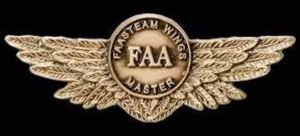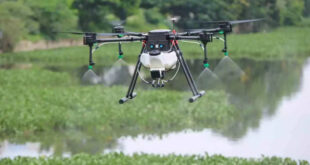The FAA Wings program has been around for a long time, helping aviators to improve their flight skills. The FAA Safety Team (FAAST) also offers free classes that benefit drone operators – an excellent resource for public safety professionals and others to keep learning. There are classes focused specifically on drones – and classes that benefit aviators of all types.
The following is one of a biweekly series on public safety drone issues by Steve Rhode, Chief Pilot with the Wake Forest Fire Department and the North Carolina Public Safety Drone Academy, and founder of Public Safety Flight, a website dedicated to information about the use of unmanned aircraft systems (UAS), UAVs, aircraft, and drones in public safety.
Becoming a Better Aviator
Sitting on the front lines of a dark, wet, and chaotic incident scene is not the place you want to start becoming a better pilot.
In my continued effort to take all new public safety drone pilots under a wing to provide friendly, honest, advice I can’t help but continue to get stuck on the issue of some new UAS pilots being “accidental aviators.”
I’ve been a manned aircraft pilot since 1988, but that does not make me a better pilot than those that fell into flying drones for fire and law enforcement in recent years. That background gives me a different reference frame and a much different educational path than the new drone “accidental aviators” of today.
An “accidental aviator” is a pilot that never had much interest in playing in the Federal Aviation Administration (FAA) sandbox but is excited about drones and has jumped right in. The reality is that as a drone pilot, you are every bit as much a pilot in the eyes of the FAA as I am or any other manned aircraft pilot: your done is not a toy, and it is an aircraft.
As a pilot, the expectation is you will always be learning, studying, and improving your knowledge. We all find a path that works best. For me, I take online classes and monthly scenario-based training to try and stay sharp. There are my required check rides in the airplane to maintain my ratings. I predict that drone pilots will also have to take practical flight exams to keep their pilot rating in the future – the training and rating retention is only going to become harder, not easier.
Start Now, With the FAASTeam
In a recent Public Safety Drone Flight podcast, I talked with Jim Moore from AOPA, who runs AOPA’s drone section. We spoke about pilot education.
That reminded me of one of the places I’ve turned to for years to take aviation classes. Most of the classes are free; they result in a course completion certificate you can show your boss; and they earn you FAA Wings credits, that will become more and more important for drone pilots.
I’ve always known it as the FAA Wings program, but it is technically the FAA Safety Team or FAASTeam website, where you can register for a free account to begin taking courses. As you take more online classes, you will earn proficiency levels and credits that show you are an active learner. You can even earn flight wings.
To search for classes, you can go to Activities > enter your keyword in the search box and select WINGS and AMT: then hit search. If you enter drone as a keyword, you will see credit classes like “Commercial Drone Pilot: CFR Part 107 Explained” or “Droning On: Safe and Successful Operation of Unmanned Aerial Systems.” Those classes are on target, but the ones I think will provide drone pilots with critical education are “Crew Resource Management: How To Do It Right”, “Aeronautical Decision Making for VFR Pilots”, and “Risk Management and the Traffic Pattern” as a start. You can take any online class for credit as a pilot. (A word of warning – or maybe just patience – the Wings site can be a bit of a chore to navigate. It is better today than it has been in the past, but there is always room for improvement. Don’t get discouraged in searching for classes once you register and can gain entry.)
Assist at the Accident, Don’t Cause One
I have found tremendous benefit out of that awarded Wings credits in the AOPA Accident Case Studies series. While many of these are about manned aircraft, they all involve fantastic insight about lessons learned and how to avoid getting in trouble while flying. One class, in particular, is so good when it comes to drone pilots flying under a COA that I watch it at least once a year. This case study focuses on a Public Aircraft Operation, like a COA drone flight.
This accident study learning experience is directly relateable to our drone flight operations. It involves pressure from command, the desire to accomplish the mission, and errant decision-making. Even if you don’t want to get your free FAA Wings credits for taking the class, you can watch Rescue Gone Wrong (video below) and think about what you can learn from the Mission Mindset incident.
A good pilot is always learning.
 Steve Rhode is an FAA-certificated airplane commercial and instrument certificated pilot, an experienced Part 107 UAS commercial pilot, and Chief Pilot with the Wake Forest Fire Department and the North Carolina Public Safety Drone Academy. He provides expert advice to drone pilots through Homeland Security Information Network and as an FAA Safety Team drone expert. Steve is the founder Public Safety Flight, a website dedicated to news, honest information, tips, and stories about the use of unmanned aircraft systems (UAS), UAVs, aircraft, and drones in the fire service and other public safety niches. Sign up for the Public Safety Flight newsletter to join Steve’s private email list, or contact Steve here. In the airplane, his FAA callsign is Fire Demon 1: and Firebird 1 with the drone.
Steve Rhode is an FAA-certificated airplane commercial and instrument certificated pilot, an experienced Part 107 UAS commercial pilot, and Chief Pilot with the Wake Forest Fire Department and the North Carolina Public Safety Drone Academy. He provides expert advice to drone pilots through Homeland Security Information Network and as an FAA Safety Team drone expert. Steve is the founder Public Safety Flight, a website dedicated to news, honest information, tips, and stories about the use of unmanned aircraft systems (UAS), UAVs, aircraft, and drones in the fire service and other public safety niches. Sign up for the Public Safety Flight newsletter to join Steve’s private email list, or contact Steve here. In the airplane, his FAA callsign is Fire Demon 1: and Firebird 1 with the drone.
https://dronelife.com/2021/03/24/faa-wings-program-becoming-a-better-drone-pilot-in-small-bites/
 Unmanned Aerial Vehicle The latest drone news
Unmanned Aerial Vehicle The latest drone news




